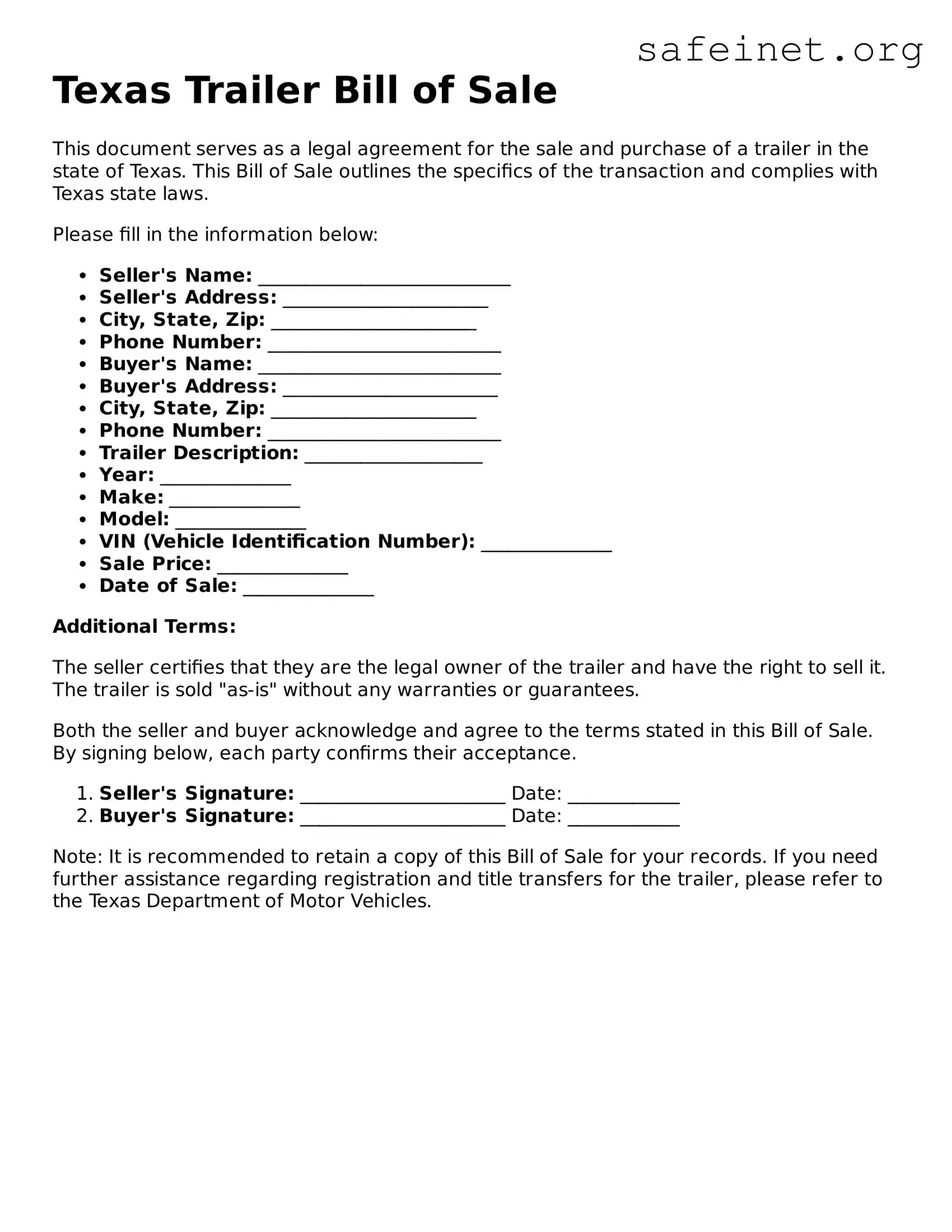What is a Texas Trailer Bill of Sale form?
A Texas Trailer Bill of Sale form is a legal document used to transfer ownership of a trailer from one party to another. It includes important information about the trailer, such as its make, model, year, and Vehicle Identification Number (VIN), as well as details about the buyer and seller. This form serves as proof of the transaction and can be crucial for registering the trailer with the state.
Why do I need a Bill of Sale for my trailer?
A Bill of Sale is essential for a few reasons. First, it provides a record of the transaction, protecting both the buyer and seller. Second, it's often required by the state when registering the trailer, as it verifies the transfer of ownership. Lastly, the document helps prevent disputes over ownership in the future.
What should I include in the Bill of Sale?
Include essential information such as the buyer's and seller's names and addresses, details about the trailer (make, model, year, VIN), the sale price, and the date of the sale. Both parties should sign the document, as this signifies their agreement to the sale. It’s also a good idea to have a notary public witness the signing to further legitimize the document.
Is a Bill of Sale required in Texas?
While a Bill of Sale is not legally required to complete a trailer sale in Texas, it is highly recommended. Having one can make the process smoother come registration time and provides a receipt for the transaction. In cases of disputes or misunderstandings, a Bill of Sale offers protection and clarity.
What happens if there is a lien on the trailer?
If there is a lien on the trailer, it’s important to resolve it before completing the sale. A lien indicates that the trailer is used as collateral for a debt. If the seller still owes money on the trailer, it can complicate ownership transfer, and the buyer could face legal issues down the line. Ensure that any outstanding debts are settled and the lien is released before proceeding with the sale.
Can I create my own Bill of Sale?
Yes, you can create your own Bill of Sale as long as it includes all the necessary information. Many templates are available online for you to use. However, ensure that the form you create meets the legal requirements set by Texas law to avoid any potential issues during the registration process.
What do I do after I complete the Bill of Sale?
Once you’ve filled out the Bill of Sale and both the buyer and seller have signed it, make sure each party keeps a copy for their records. The seller should provide the buyer with the necessary documentation for registration, including the Bill of Sale, the original title (if applicable), and any other required documents. The buyer will then need to take these items to their local Department of Motor Vehicles (DMV) to register the trailer in their name.
Are there any fees associated with registering a trailer in Texas?
Yes, there are typically fees associated with registering a trailer in Texas. The exact amount varies based on factors such as the size and weight of the trailer. It's advisable to check with the local DMV for the most accurate fee information. Be prepared to pay these fees at the time of registration, along with any required taxes.
What if I lose my Bill of Sale?
If you lose your Bill of Sale, it's advisable to try to retrieve a copy from the other party involved in the sale. If that's not possible, you can recreate a new Bill of Sale based on the initial agreement. Include as much detail as possible about the transaction, and both parties should sign the new document to confirm the agreement again. However, having a copy of the original is always the best practice.
